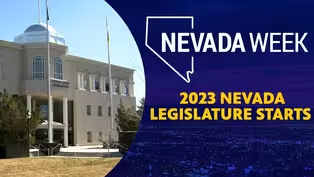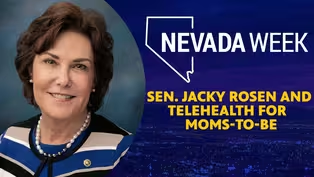
Legislature and moms-to-be
Clip: Season 5 Episode 31 | 8m 35sVideo has Closed Captions
Advocates are working on new bills to help Nevada’s moms-to-be
Advocates are working on new bills to help Nevada’s moms-to-be
Problems playing video? | Closed Captioning Feedback
Problems playing video? | Closed Captioning Feedback
Nevada Week is a local public television program presented by Vegas PBS

Legislature and moms-to-be
Clip: Season 5 Episode 31 | 8m 35sVideo has Closed Captions
Advocates are working on new bills to help Nevada’s moms-to-be
Problems playing video? | Closed Captioning Feedback
How to Watch Nevada Week
Nevada Week is available to stream on pbs.org and the free PBS App, available on iPhone, Apple TV, Android TV, Android smartphones, Amazon Fire TV, Amazon Fire Tablet, Roku, Samsung Smart TV, and Vizio.
Providing Support for PBS.org
Learn Moreabout PBS online sponsorship-We move now to a November report from the Centers for Disease Control and Prevention.
The CDC says that in 2021, home births in the United States reached their highest level in 30 years.
The CDC reports that Nevada has seen its own increase, which is why birth rights advocates argue state legislation is needed to support the workers who provide home birth related services.
And joining us to discuss that legislation is Erika Washington, Executive Director of Make It Work Nevada.
Erika, thank you for joining us.
(Erika Washington) Happy to be here.
Tell me why someone would want to have a home birth, for those who don't understand, and outside of a hospital.
-I think a lot of people want control, and they want autonomy.
They want to have an opportunity to have their baby in a peaceful setting and not a sterile hospital.
They want to be surrounded by their their family or their friends or their pets or what have you.
I think it's just really about autonomy and just feeling safe.
And I think especially after COVID, you know, folks just didn't really want to go to the hospital.
They haven't-- they didn't have a real need to.
And for the longest time, pregnancy and childbirth wasn't considered medical, you know?
So it was something that was done at home for, you know, centuries and in more recently in the 19th century that we started using hospitals as a place for birth.
And so I think people were trying to maybe get back to their roots a little bit.
-And what about the concern for C-sections, also financial costs at a hospital?
-It's huge, though, right?
I had a C-section with my, my youngest child.
And I remember getting the bill and I did have insurance, but the bill that says it's not a bill, it was about $40,000.
And I can't imagine if that was something that actually was a bill.
And that was with a C-section.
Now mind you, sometimes it's medically necessary.
But many times I think those things can be avoided.
And we are, you know, I think as, as moms as parents as folks, were looking for alternative ways to have healthy pregnancies and also healthy births.
-And as you said, sometimes they are medically necessary, but I think there is a concern that if I go to a hospital I'm more likely to have one-- -Yeah.
- --than if I go somewhere else that's outside of that setting.
Maternal mortality rates in the United States are high when you compare the U.S. to similar nations of wealth that we have here.
That's according to the Commonwealth Fund.
How much of a role does that play also in the decision?
-I think it plays a major role.
I think you have extremely high rate of maternal mortality, especially in the Black community.
And what they have found, it really doesn't have anything to do with income levels.
There are folks who are at the higher tier level of income and still have died in childbirth.
Make It Work Nevada has been creating and producing a podcast called American Dreams: Reproductive Justice .
And we have a specific episode where we talk about an actual CDC doctor who died after childbirth because she wasn't listened to, she wasn't heard.
And we believe that comes from, you know, a lot of different components.
But you know, the history of gynecological research and how that started came from experiments on enslaved women, and they weren't able to have any sort of pain medication or anything like that.
They didn't believe that we felt pain.
And for some reason, that seems to still permeate a lot in the medical community that-- And things, things just show up differently.
As much as we'd like to say we're all the same, we're not exactly the same.
And so when something, a medication or a different event, how it might affect and show up on you will look completely different on me.
Someone might say, Oh, well, are you pale?
I may not show up as pale.
So how would you know?
And so I think having more, more research will be helpful in trying to alleviate that.
But also, as you said, I think that people just want to be at home because they feel safer.
-So midwifery and doulas, what are the differences between a midwife and a doula?
-Sure.
Well, a doula is a, is a professionally trained expert that guides clients through various life experiences.
That's pregnancy, that's childbirth, it could be a miscarriage, abortion.
And there are also nonreproductive doulas that are death doulas that help folks through the transition as well.
A midwife, on the other hand, is a healthcare provider that, they catch the babies, you know?
So they can do it both in a hospital in some aspects, and they can also do it at home.
-What legislation are you following concerning midwives this session?
-So there is a midwifery bill.
It is a repeat from last session where it did not pass.
And so we are not-- we're not leading on that bill.
We're more or less keeping an eye on it, because we have deep ties with the midwifery community.
And we just want to make sure that folks are at the table that need to be there.
The bill right now is about licensing and setting standards for midwives.
The issue that we're seeing is that a lot of midwives come from different backgrounds, and they've been trained differently.
So trying to set up a standard is a little bit difficult when there isn't already a standard in the state.
And so another issue that we're hearing is that a lot of midwives, they don't want to be controlled by outside entities.
They want to be able to self govern, making such examples that, a dentist doesn't control how an orthopedic surgeon does their work.
And so they want to make sure that they have, they're in the parameters of the work and that there's not a lot of outside bias for people who just believe midwives shouldn't, you know, do any procedures at all.
-And that's something that's kind of inherent within the profession of-- We don't want to be connected to the medical establishment.
-Yeah.
I think also going back to the-- getting back to the roots, getting back to a more holistic way of bringing a child into this this world.
I think they want to make sure that they are not necessarily-- and I'm saying "they," meaning not all, because they're not a monolith.
There are some midwives who are very pro-licensing, and then there are others who are very anti-licensing.
And so, but what I'm hearing from all of them is that they want to be able to have the same autonomy as doctors and such.
-For doulas, you are watching legislation that's building upon legislation from the last session.
-Yeah, I'm very excited.
We won.
We won, you know, the opportunity to have doulas expanded into Medicaid so that Medicaid recipients would be able to have a doula provider and they could be reimbursed by Medicaid.
And that is something that they're doing across the country in various states.
And so we were able to pass that last session.
This session, what we're trying to do is strengthen that because the reimbursement rate for doulas that was passed last session was about $350 total for five visits, and that includes them being present during the birth.
That's not enough money to do much of anything.
And I'm not even sure if you're gonna buy any eggs with that at this point.
So, and we're one of the lowest reimbursement states.
Michigan just passed their doula, their doula bill, and it's $1,500.
And so what we are wanting to do is be able to also add more visits past five.
So, you know, during pregnancy, childbirth, and postpartum because you also want to be able to keep an eye on the mother and the baby.
But thinking about any side of-- any type of postpartum issues.
But also the birth.
A birth will last as long as it wants to, you know?
We don't control how long it takes for the baby to get here.
And so $350 is just not going to do it.
So we want to expand that.
-And how has that gone so far with doulas registering with the state in order to get reimbursed?
-So it's been real slow, as you can imagine, because I mean, who really wants just $350 to do that much work?
And when you think about the cost of living and when you think about the amount of paperwork that will have to be done and certification, you know, with the state for being able to receive this reimbursement with Medicaid, it just, it wasn't taking.
And so we've had some who have registered, and we're actively trying to get more involved because they want to do the work.
But we have to be realistic about what people need to be comfortable.
-Yeah.
How they should be appropriately reimbursed.
Erika Washington, Make It Work Nevada, thank you for your time.
2023 Nevada Legislature Starts
Video has Closed Captions
Clip: S5 Ep31 | 6m 47s | We speak with a reporter from the Nevada Independent about the Nevada Legislature. (6m 47s)
Video has Closed Captions
Clip: S5 Ep31 | 5m 20s | The nonprofit Baby’s Bounty is expanding its diaper bank for families in need. (5m 20s)
Sen. Jacky Rosen and telehealth for moms-to-be
Video has Closed Captions
Clip: S5 Ep31 | 4m 57s | Sen. Jacky Rosen led an effort to address maternal mortality rates using data. (4m 57s)
Providing Support for PBS.org
Learn Moreabout PBS online sponsorship
- News and Public Affairs

Top journalists deliver compelling original analysis of the hour's headlines.

- News and Public Affairs

FRONTLINE is investigative journalism that questions, explains and changes our world.












Support for PBS provided by:
Nevada Week is a local public television program presented by Vegas PBS


